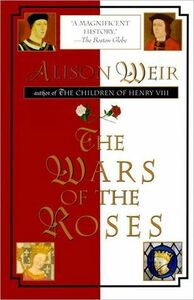Take a photo of a barcode or cover
Not a bad book, but certainly one of the less readable of Weir's histories I have tried to read.
And in fact, the first Weir I have given up on and returned to the library rather than finishing.
Made it to page 125 of 420, so gave it a good shot before moving on to something that kept my interest better and was easier to follow, then it was due back.
Might try to read the rest at a later date.
And in fact, the first Weir I have given up on and returned to the library rather than finishing.
Made it to page 125 of 420, so gave it a good shot before moving on to something that kept my interest better and was easier to follow, then it was due back.
Might try to read the rest at a later date.
Very interesting material, but Weir's writing is a bit too dry and doesn't bring out any of the personalities involved (and this was a dynastic war driven primarily by personality) in a vivid way. Still read most of it in about a week, but I've read much better history books.
adventurous
challenging
dark
emotional
informative
tense
medium-paced
adventurous
challenging
dark
emotional
informative
sad
tense
medium-paced
As exhaustive as it is exhausting, Alison Weir's The Wars of the Roses is the most readable history textbook on the Wars of the Roses that you will come across, though that doesn't mean it makes for a great read.
Historians are historians. Just because they spend their time poring over books and manuscripts, that doesn't make them good writers. And that is the case for most historians. After all, they're not out to tell a good story. Instead, they are out to talk about history. Nothing wrong with that, of course. It's just a matter of managing your expectations. Don't expect to go into a non-fiction book — written by a historian no less — and find a page-turner.
At least that's the case for most books by historians. If you've ever dreaded your history textbook, you know what I am talking about. Even if the subject matter is exciting, history textbooks almost always have the reputation of turning anything into a dry read. That's just the way historians right. They are not about cliffhangers and plot twists. They are about historical accuracy and, to be honest, we have to applaud them for that.
Alison Weir, on the other hand, has the reputation of writing easy-to-access historical novels that are high on readability. She keeps the history moist and fluffy, so to speak, like a nice sponge cake. At least that is what my friend told me before I cracked open the cover of The Wars of the Roses, a period of medieval English history that I have intense interest in.
You see, just two weeks ago, I'd just finished Maurice Druon's The Accursed Kings series. It ended with Edward III being crowned as king in England, and the story ended swiftly after that. The Wars of the Roses, on the other hand, is supposed to pick things up right after, and I was pleasantly surprised at how well everything joined up. I thought, instead of delving into yet another historical fiction, why not go for the real story instead? Another reason that motivated me to pick up Weir's book is because George RR Martin, the author of A Song of Ice and Fired, often cites the conflict between York and Lancaster as inspiration for his novels — how many more reasons do I need to pick this up, really?
And it's true what others say. Weir has a simple, straightforward language that keeps things engaging. She definitely has a flare, no doubt about that, and the writing style is easy enough for even the most impatient readers out there. Besides, the subject matter is as good as it gets if you are into medieval politicking. You have monarchs scheming, poisoning, and killing one another for a shot at the throne, and how incompetent kings are reduced to puppets by the people around him. It's A Song of Ice and Fire without the dragons and the magic, and it is everything that you'll come to expect.
Yet, a problem. Aside from being a good writer, Weir is also a really, really good historian. She's so good that she's decided to include every itty-bitty detail about what went on during the Wars of the Roses. Of course, we are dealing with a particularly tremulous period of English history, and the unhappiness between the Yorks and the Lancasters is renowned to be complicated. The problem here is that the book feels like a regurgitation of facts after facts after facts. We get to know the chief players involved in the conflicts, yes, but then you have all these other extraneous information thrown in between the lines. For example, you often get a detailed breakdown of exactly what Queen Margaret spent her money on —jewels, dresses, and the likes — do we really need to know that? I suppose, if you want immersive, this is as good as it gets. You get to know everything there is to know about the time, the people, the land, the food — everything. The problem is that everything feels very... statistical. It's too quantitative for its own good.
It's not that I was hoping for yet another historical fiction. It's just that, we such a rich history to draw from, I'd expected something perhaps a little more qualitative. Weir would often talk about a major betrayal by one of the characters without going into just how big the betrayal really is. I suppose, as a historian, you are supposed to main a certain level of objectivity — much like a surgeon in the operating room. But it doesn't necessarily make for a good read, and the result is, though exhaustive and informative, exhausting to the reader.
Still, before I end this review, I must say that I now have a much, much, MUCH better understanding of this part of English history. Thanks to Weir, I'm now a little smarter than when I read the first page of this book. But my brain feels like it's been punched around a little and bruised on the sides. This is probably what information overload feels like. I just wished that someone with a red pen had gone to work on Weir's writing, telling her which parts to cut out altogether. It doesn't destroy the integrity of the story and the history, after all, you're just leaving the juicy bits for the readers to crave for more. Maybe this is because I've been spoilt by the likes of Erik Larson, who can tell a wicked tale even with the hard facts.
I recommend this book for anybody with a vested interest in this period of European history, and you want to know everything there is to know about what happened between the Yorks and the Lancasters right down to the most minute mechanism.
Historians are historians. Just because they spend their time poring over books and manuscripts, that doesn't make them good writers. And that is the case for most historians. After all, they're not out to tell a good story. Instead, they are out to talk about history. Nothing wrong with that, of course. It's just a matter of managing your expectations. Don't expect to go into a non-fiction book — written by a historian no less — and find a page-turner.
At least that's the case for most books by historians. If you've ever dreaded your history textbook, you know what I am talking about. Even if the subject matter is exciting, history textbooks almost always have the reputation of turning anything into a dry read. That's just the way historians right. They are not about cliffhangers and plot twists. They are about historical accuracy and, to be honest, we have to applaud them for that.
Alison Weir, on the other hand, has the reputation of writing easy-to-access historical novels that are high on readability. She keeps the history moist and fluffy, so to speak, like a nice sponge cake. At least that is what my friend told me before I cracked open the cover of The Wars of the Roses, a period of medieval English history that I have intense interest in.
You see, just two weeks ago, I'd just finished Maurice Druon's The Accursed Kings series. It ended with Edward III being crowned as king in England, and the story ended swiftly after that. The Wars of the Roses, on the other hand, is supposed to pick things up right after, and I was pleasantly surprised at how well everything joined up. I thought, instead of delving into yet another historical fiction, why not go for the real story instead? Another reason that motivated me to pick up Weir's book is because George RR Martin, the author of A Song of Ice and Fired, often cites the conflict between York and Lancaster as inspiration for his novels — how many more reasons do I need to pick this up, really?
And it's true what others say. Weir has a simple, straightforward language that keeps things engaging. She definitely has a flare, no doubt about that, and the writing style is easy enough for even the most impatient readers out there. Besides, the subject matter is as good as it gets if you are into medieval politicking. You have monarchs scheming, poisoning, and killing one another for a shot at the throne, and how incompetent kings are reduced to puppets by the people around him. It's A Song of Ice and Fire without the dragons and the magic, and it is everything that you'll come to expect.
Yet, a problem. Aside from being a good writer, Weir is also a really, really good historian. She's so good that she's decided to include every itty-bitty detail about what went on during the Wars of the Roses. Of course, we are dealing with a particularly tremulous period of English history, and the unhappiness between the Yorks and the Lancasters is renowned to be complicated. The problem here is that the book feels like a regurgitation of facts after facts after facts. We get to know the chief players involved in the conflicts, yes, but then you have all these other extraneous information thrown in between the lines. For example, you often get a detailed breakdown of exactly what Queen Margaret spent her money on —jewels, dresses, and the likes — do we really need to know that? I suppose, if you want immersive, this is as good as it gets. You get to know everything there is to know about the time, the people, the land, the food — everything. The problem is that everything feels very... statistical. It's too quantitative for its own good.
It's not that I was hoping for yet another historical fiction. It's just that, we such a rich history to draw from, I'd expected something perhaps a little more qualitative. Weir would often talk about a major betrayal by one of the characters without going into just how big the betrayal really is. I suppose, as a historian, you are supposed to main a certain level of objectivity — much like a surgeon in the operating room. But it doesn't necessarily make for a good read, and the result is, though exhaustive and informative, exhausting to the reader.
Still, before I end this review, I must say that I now have a much, much, MUCH better understanding of this part of English history. Thanks to Weir, I'm now a little smarter than when I read the first page of this book. But my brain feels like it's been punched around a little and bruised on the sides. This is probably what information overload feels like. I just wished that someone with a red pen had gone to work on Weir's writing, telling her which parts to cut out altogether. It doesn't destroy the integrity of the story and the history, after all, you're just leaving the juicy bits for the readers to crave for more. Maybe this is because I've been spoilt by the likes of Erik Larson, who can tell a wicked tale even with the hard facts.
I recommend this book for anybody with a vested interest in this period of European history, and you want to know everything there is to know about what happened between the Yorks and the Lancasters right down to the most minute mechanism.
Very interesting. My only complaint is that it was hard to keep track of people. The period of history covers multiple generations, and titles get passed around as various groups are in power. Yet they are still often referred to by their titles. Still, the detailed genealogical tables at the back helped enormously, and it was a very interesting read.
Informative, detailed, mostly fascinating (for period history buffs, at least).
I think I liked the Dan Jones version ever so slightly better. It was still good though.
Alison Weir manages to make this tumultuous period in English history almost coherent - and that is a remarkable achievement. While yes, it can be dense, it's never boring. Definitely worth a read if you have an interest in the saga of York vs. Lancaster, or if you simply want to understand what the hell's going on in Shakespeare's Henry VI trilogy.
The weaknesses of this book are actually not the book's nor the author's fault. First of all you have to be a big fan of 15th century history to be interested in the subject of the War of the Roses. While I did want to know more about this period of time I would have preferred a less detailed account. Secondly there is a huge cast of characters in this book, once again, not the author's fault, that's just the way it was. It did, however make it a little confusing to follow.
Alison Weir's account of Henry VIII is one of my favorites, this book was just a little too much.
Alison Weir's account of Henry VIII is one of my favorites, this book was just a little too much.






